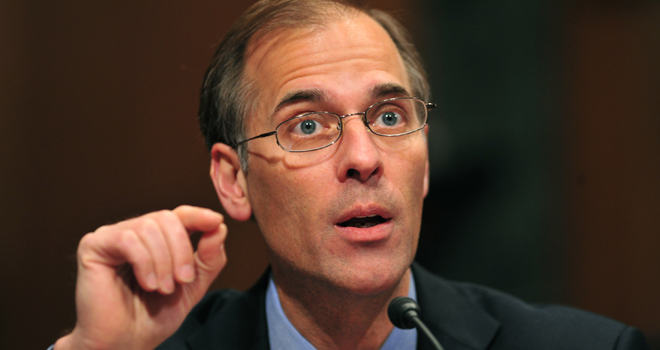How big are the stakes on Capitol Hill right now? According to one of the most influential economists in federal policy making, the next four weeks will make the difference between a slow glide toward economic recovery, and a severe tumble into a new recession.
[TPM SLIDESHOW: More Than Just Forms: Tax Day Tea Party-Style]
Moody’s chief economist, and former McCain economic adviser Mark Zandi is forecasting GDP growth of 4 percent by the end of the year and into next. But in response to a question from TPM, he told reporters at a breakfast meeting hosted by the Christian Science Monitor that his forecast would be “blown out of the water,” if Congress fails to “reasonably gracefully” raise the national borrowing limit.
If Congress fails to raise the national debt limit by early August, the Obama Treasury Department will have to choose between defaulting on obligations to the country’s creditors — triggering higher interest rates and perhaps damaging the country’s credit rating for months and years to come — or freezing outlays to contractors, entitlement beneficiaries and others who are also expecting prompt payment as well. In either case, the macroeconomic impact will be staggering, according to Zandi.
“I think we go into recession and my forecast would be blown out of the water,” he said. “I think if we get to August 2nd and there is no debt ceiling [increase] and there has to be significant spending cuts, I think even if Congress and the administration reverse themselves days later, I think the damage will have been serious and we’ll probably be thrown into a recession.”
Additionally, Zandi noted, “The cost to taxpayers would be enormous, because we would nail tax revenue and spending would increase because of the automatic stabilizers in the budget. So it would be just the wrong thing for the economy and the wrong thing for trying to address our long-term fiscal issues.”
Failure to raise the debt limit isn’t the only threat to the economy, though it may be the greatest. Another spike in oil prices could constrain growth, as could an unexpectedly steep decline in housing prices. But any big shock could throw the prospects for steady recovery into doubt.
“The collective psyche is extremely fragile, I think. As I talk to business people in every industry across the country they’re extraordinarily nervous. And that’s why if anything goes slightly wrong, the economic consequences, the negative consequences, are amplified,” Zandi said. “People are so nervous and they freeze when things go badly.”
Fortunately, for the members of Congress who think failing to raise the debt limit is no biggy, Zandi said markets will make it clear to them that they have to act as August approaches.
“When you look at the price for buying insurance for the default of a U.S. Treasury bond one-year out, that price, that cost has doubled since the beginning of the year,” Zandi noted. “If we get on the other side of July, particularly as we move to the second, third week of July and nothing has happened — if the world looks like it is today — then I think people are gonna start getting nervous, one investor at a time.”
Here’s the sequence of events:
[I]t’s going start showing up in rising bond yields, weakening equity market. And then all of a sudden we’re going to a day when we’re going to get a critical mass of investors saying, ‘you know what, this may not happen, we better attach a probability to an August 2 misstep.’ And markets are going to start going south. And of course the ratings agencies are going to start responding, too — they’ve announced that they’re going to start responding by mid-July if there is no progress. And so I think if we get to the end of July, policy makers will see it quite clearly. And if we get to August 2 it’s going to be a TARP moment. I think its going to be very uncomfortable in that they’ll have to reverse themselves pretty fast.
For the moment, though, Republicans won’t budge unless Democrats agree to take huge bites out of key social programs, with minimal or no new provisions to take on new tax revenues. This despite the fact that there hasn’t been much new spending since the stimulus.
“Since ’09 there’s been no increase in nominal dollar spending,” Zandi said. “There’s significant fiscal restraint in the current budget, and any additional fiscal restraint — whether that be through tax increases or spending cuts — in the near term, in the next year or two, would be I think a mistake. That the economy is going to have to digest the fiscal restraint that’s already in train and added to that would be at this point probably too much for the economy to bear.”










